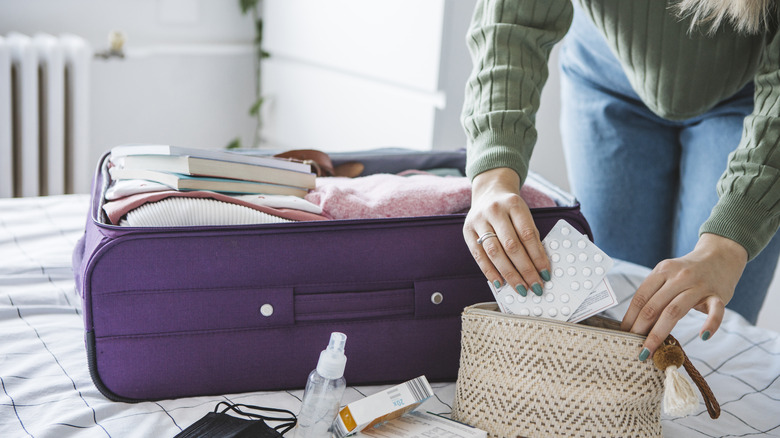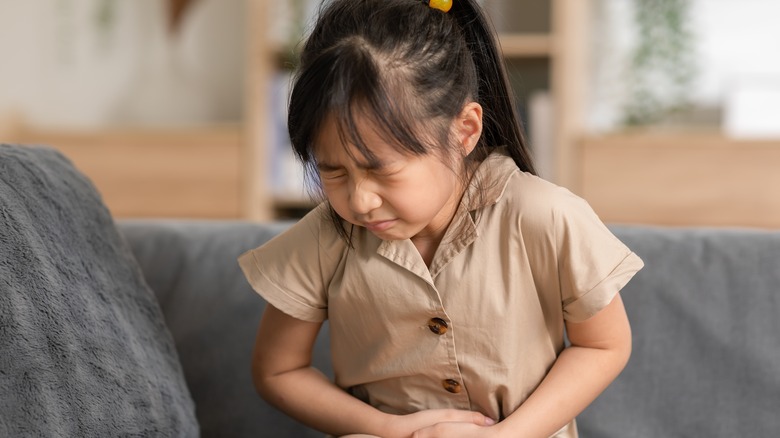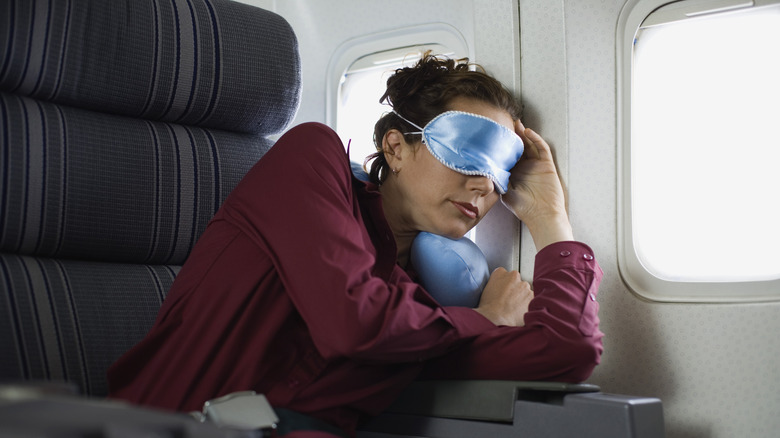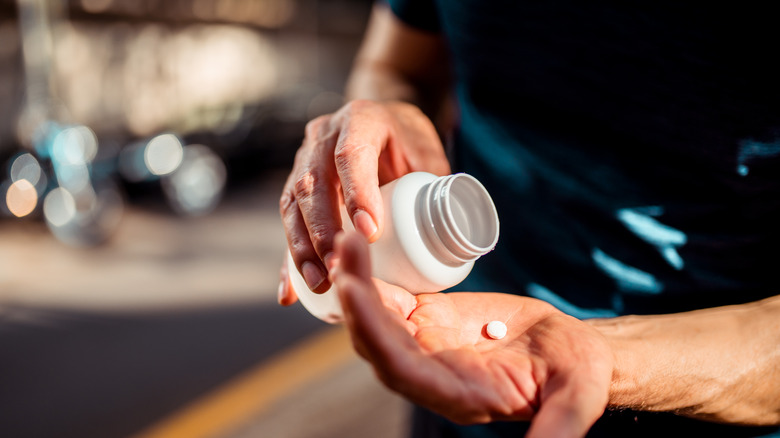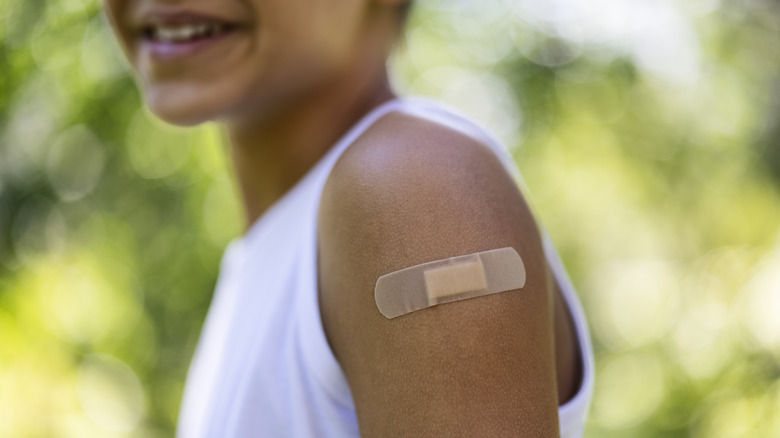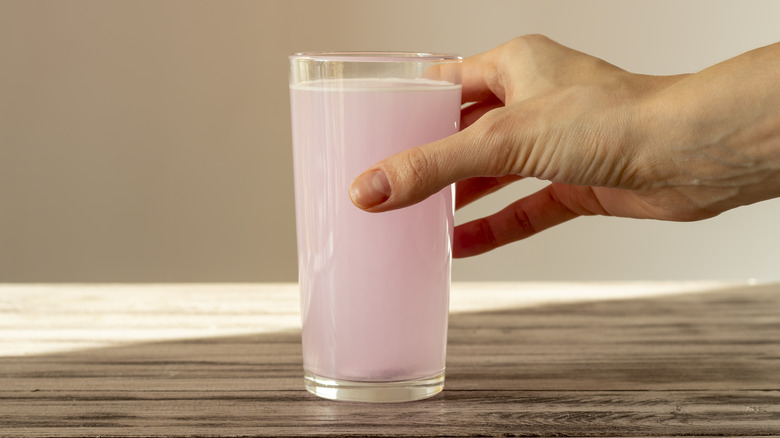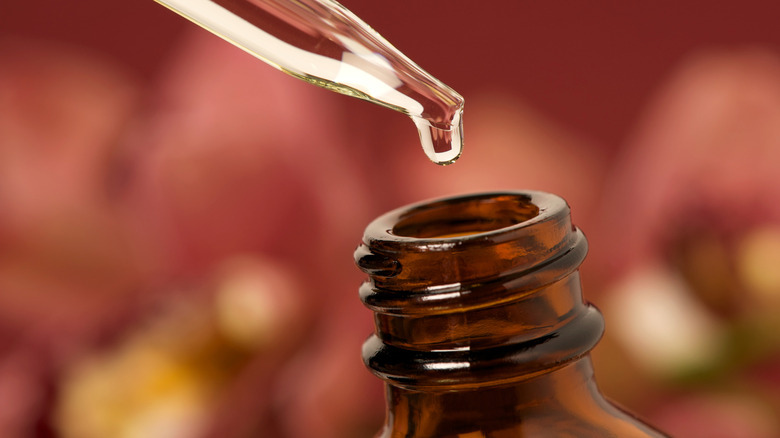Create The Perfect DIY Kit For All Of Your Medical Needs While Traveling
No one wants to imagine getting sick while traveling — but it happens. Unfortunately, we can attest to how easy it is to catch a bug, eat spoiled food, or just get way too much sun and ruin a perfectly good day. Luckily, we've got some tried-and-true items to recommend you pack in your own portable medical kit for your next vacation. You don't have to bring all of these — though you may want to consider it to avoid paying high prices for hotel meds or rushing to urgent care from your vacation destination.
The trick to making a useful medicine kit is to bring a little bit of everything along to ensure you aren't missing something important. That doesn't mean loading up an entire extra suitcase with stuff, though it does mean being organized to ensure you are bringing what you may need. To help you remember, we've also come up with an acronym — TRAVEL — to make it easier to remember your kit.
T - Tummy
No matter where you're headed in the world, tummy trouble can strike when you least expect it. And when it comes to medical issues while traveling, an upset stomach is usually the top complaint. "In general, I think the most common things that people get [when traveling] are upset stomach, bloated and constipation," Dr. Michelle Cohen, a gastroenterologist at Mount Sinai New York, tells SheKnows.
There are a plethora of tummy-saving items to choose from, and you can pack most of them with very minimal space to bring on your next adventure. Even a travel roll of TUMS, which is the size of a finger, can come in handy in a pinch. Or if you have a large container in the medicine cabinet, put a few in a Ziploc bag, a medicine box, or another reusable baggie and bring them that way.
In the case of bathroom issues like diarrhea, bring some Imodium or bismuth subsalicylate (Pepto Bismol) with you. Like TUMS, these two medications can bring you a lot of relief in a little package. Plus, you may not be able to get them where you're going (or you'll be stuck paying a lot more than you would back home). When it comes to stomach issues, it's always better to be over-prepared. Once you ride a plane for several hours with unrelenting food poisoning, you'll never want to do that again.
R - Rest
Sleeping somewhere other than your home can be hard, especially if you're a little kiddo. Regardless of how you help your travel team get some much-needed sleep, bringing a supplement could alleviate a bad night for everyone. Whether you decide to bring some Sleepytime Tea, Melatonin, or stronger sleep aid (for the grown-ups), this is a crucial piece of staying healthy while on the go.
When purchasing sleep aids for children, be sure that they are suitable for their little growing bodies. Gummy sleep aids made for kiddos often don't have melatonin in them, or if they do, it is a very small dosage. It is crucial not to give them adult sleep aids unless directed by a doctor.
Sleep masks can also help maintain your rest. Be sure you find one that you can easily sleep and travel with before making a commitment. Masks aren't for everyone — but if you find one that works really well for you, it may be the best sleeping companion you could ask for. It also makes it a lot less onerous if your travel companions are early risers who need sunlight and you are not.
A - Acetaminophen
For potential aches and pains from walking 10 miles or just bumping into a staircase railing, acetaminophen or your preferred pain reliever is often a good idea. These are things you can usually buy at a premium at your hotel, so it isn't the end of the world if you forget it. But you might be saving a pretty penny by just bringing your own.
Some of the name brands you may be familiar with that contain acetaminophen include Tylenol, Excedrin, and Alka-Seltzer. It also acts as a fever reducer if someone happens to catch a bug on the plane or while traveling.
"Acetaminophen is often the OTC pain reliever I recommend first for minor ailments," family medicine physician David Miller tells Scripps Health. "It is very safe when taken appropriately and is less likely to cause stomach irritation than an NSAID." That said, ibuprofen works better for "menstrual cramps and sore muscles," Dr. Miller adds. So you could always pack both. Still, if you can only choose one because of space, you might as well go with acetaminophen.
V - Veins
Boo-boos happen. And when they do, whether you're a four or 40-year-old traveler, you're going to want some Band-Aids. A good idea is to bring a petite, travel-sized first aid kit with some Band-Aids, gauze, antiseptic wipes, etc. That way, you're covered for the bigger boo-boos too. Band-Aids will help protect the injury from possible infection, which is ideal.
Having extra Band-Aids on hand is also a good idea, even if you end up not needing them for an injury. They are especially helpful for protecting existing blisters or preventing new ones. Even wearing a pair of shoes on a 10-mile hike could leave your feet looking worse for the wear.
Another unique use for Band-Aids? Use them as outlet covers. For travelers with crawling babies or curious toddlers, a Band-Aid can be a great DIY plug cover to place over hotel electrical outlets to keep tiny fingers out of them. Just try to remember to take them off before checkout for the sake of your housekeepers.
E - Electrolytes
This entry is particularly important if you are headed to a hot destination where it's summer all the time. You'd be surprised how quickly you can dehydrate even on a quick walk in 100+ degree weather. This is where electrolytes come in. "Electrolytes, such as sodium, potassium, and chloride, are minerals that help balance and regulate the fluids in your body and are essential for muscle and nerve function," hydration scientist Jennifer Williams tells Well + Good. "You get electrolytes from what you eat and drink, and you lose them any time you expel fluids."
Travel-friendly electrolyte products that are great alternatives to standbys like Powerade and Pedialyte include powders, packets, or liquid water additives. Not only are these products great for keeping you hydrated, but they will help you beat the heat in a tasty way. Best of all, some electrolyte powders are meant to hydrate and boost your immune system. So, if you find yourself chugging Emergen-C before a flight, consider grabbing an electrolyte powder with added immune benefits as well.
L - Ligaments
Okay, ligaments are probably a stretch ... get it? But for folks who'd prefer not to pop pills constantly for muscle aches and pains, this entry is for you. Packing a small muscle roller or essential oils that can help relieve pain is our go-to packing tip. Not only are both of these things small enough to pack easily, but they're also non-medicinal ways to keep healthy even if your legs are screaming at you for walking too much.
If you've never used essential oils for muscle pain before, start with peppermint oil. As Healthline notes, not only does it have anti-inflammatory properties, but it contains menthol, providing a "cooling effect on sore, achy muscles." Lavender oil is another multi-use essential oil that makes a great travel companion. It can help with relaxation, muscle aches, and nausea.
Plus, a few drops of your favorite essential oil on a cotton ball in your suitcase will keep your luggage smelling fresh — especially during the end of your vacation when your clothes could use a wash. Although these oils have to go in a liquid bag for airport security, they're in such small containers that the extra space they take up is minimal.
